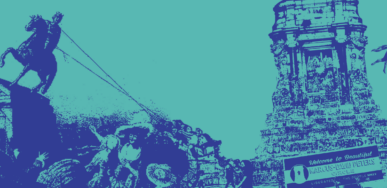
When Verse Goes Viral
[00:00:00] Kurtis Schaeffer I'm Kurtis Schaeffer.
[00:00:01] Martien Halvorson-Taylor And I'm Martien Halvorson-Taylor. And this is Sacred & Profane, a show where we explore how religions shape us ...and how we shape religions.
[00:00:13] Kurtis Schaeffer Our story today can start in many times and places, but let's make it simple and go back to May of 2020. If you can remember the early days of COVID 19, that's when millions of people around the world suddenly found themselves inside and cut off from their daily routines.
[00:00:31] Martien Halvorson-Taylor That was the case for Muhammad Ali Mojaradi
[00:00:34] Muhammad Ali Mojaradi Hello, everyone. First of all, thank you for having me. My name is Muhammad Ali Mojaradi. I'm an Iranian-American who is in Tehran at the moment.
[00:00:46] Corona had just started and I figured, okay, I need something to do. You can get a job. You know, it was right at he beginning of the lockdowns. There's no one is going to hire you. I was just sitting at home.
[00:00:57] Martien Halvorson-Taylor But right there on his bookshelf was something to do.
[00:01:02] Muhammad Ali Mojaradi Every Persian speaking family has a few poetry books on their living room bookshelf. They're usually these fancy leather bound editions that maybe you'd read on a holiday or some sort of special event, like a wedding. So I grew up with that collection of books, but like most families, we didn't really sit down and read them that also.
[00:01:19] Martien Halvorson-Taylor As a hobby, he'd been translating Persian poetry for curious friends in the U.S..
[00:01:25] Muhammad Ali Mojaradi I think it was just to kind of show some elements maybe that I found particularly captivating to my friends.
[00:01:32] Martien Halvorson-Taylor But the pandemic meant that he finally had the time to translate poetry every day.
[00:01:40] Muhammad Ali Mojaradi And it really motivated me to kind of put full energy into this project that had really just been maybe like on the weekend, I would read a couple of ponds, translate a line to it and set it aside until the next week.
[00:01:53] Kurtis Schaeffer He kept posting his translations online to Instagram and to a new account on Twitter, which he often edited short tweets explaining the background of some of the poets. People seemed to enjoy what he was sharing, but he was tweeting for a niche audience. So when he posted a tweet thread one May afternoon about a poet who died almost 800 years before he thought the most it would do was start a conversation among his followers.
[00:02:21] Muhammad Ali Mojaradi First, you know, it spread through, you know, circles of people who were maybe my peers, you know, university students. And then I started to see journalists and academics and professors of Islamic studies or people that I've been following their work and reading their books or retweeting my thread saying, Wow, this is great. Everyone, you know, check this out.
[00:02:39] Martien Halvorson-Taylor In other words, it went viral.
[00:02:42] Muhammad Ali Mojaradi And I was I was just utterly in shock. My phone was overheating from the notifications.
[00:02:52] Martien Halvorson-Taylor Maybe it shouldn't have been a surprise that thousands and thousands of people were interested because the poet that Muhammad had been writing about was Rumi. Chances are, if you're an English speaker, you've come across a poem by Rumi before, even if you didn't know it. Books of Rumi's poetry have been bestsellers in the U.S. for many years, and clips of Rumi have become popular inspirational quotations. It's the kind of universalist, inspirational text that splashed over a photo of a beautiful mountain landscape and posted on Facebook or Pinterest.
[00:03:33] Internet Rumi quote The wound is the place where light enters you.
[00:03:38] Internet Rumi quote There is a candle in your heart ready to be kindled. There is a void in your soul ready to be filled. You feel it, don't you?
[00:03:49] Internet Rumi quote A heart filled with love is like a Phenix that no cage can imprison.
[00:03:56] Kurtis Schaeffer You won't just find Rumi on the Internet, of course. Coldplay uses Rumi as song lyrics. Beyonce named one of her children Rumi. Brad Pitt has a line of Rumi's poetry tattooed on his arm.
[00:04:21] Internet Rumi quote
[00:04:23] Martien Halvorson-Taylor That last bit was also tweeted out by Ivanka Trump in reaction to her father's so-called Muslim travel ban.
[00:04:31] Kurtis Schaeffer And all this was what was bothering Mohammed Majid when he started tweeting about Rumi's translation. These bits of verse were circulating everywhere, but they were totally unlike the Rumi he had grown up with as a Persian speaker and the poetry he'd spent so many hours reading and translating himself. But before we get to how and why, a long dead poet from Central Asia has become the source of English-language inspirational quotes, let's talk about who Rumi was. Even the name we know him by in English shows us how complex the idea of translating his work can be.
[00:05:10] Muhammad Ali Mojaradi So Rumi, as he is known in the West, was born Mohammed ibn Hosain al-Bayati. It's interesting that he became known as Rumi in the West is called "Rum," I should say Rumi, because he ended up living in what Muslims called "Rum" at the time, which is Arabic for Rome. He didn't live in the city of Rome. He lived in Anatolia, in modern Turkey. But because it was recently conquered from the Roman Empire, the Byzantines, Muslims persisted in calling it Rome.
[00:05:41] Martien Halvorson-Taylor Rumi did live in what is now Turkey, but he was born along the border of modern day Afghanistan. His family left the city he grew up in, possibly after it was sacked by Genghis Khan. They moved from city to city in the Islamic world.
[00:05:57] Muhammad Ali Mojaradi Rumi's family did spend months traveling through the Muslim world trying to secure employment. But all the places that they went to were already well settled. You know, there were local scholars there. They didn't really need people, so they were forced to go to the far frontiers.
[00:06:16] Martien Halvorson-Taylor Eventually they settled in the city of Konya, and his father founded a well-respected madrassa that Rumi would help to run.
[00:06:24] Muhammad Ali Mojaradi It wasn't like Baghdad or Damascus or Cairo or, you know, Mecca and Medina, where his dad was hoping you could find a job where Islam is settled and most people are Muslims or if they're not they're culturally Arabic, right? So you have Christians, but they speak Arabic. In Konya, Rumi was living amongst Greek Christians and Armenian Christians and Turks and Kurds who still had not become Muslims. So they were still following animistic religions. Or maybe they would be called pagan religions, I think. Rumi, living among so many non-Muslims and having non-Muslim students - and it's even thought maybe his first wife diedis second wife was a Christian. This kind of maybe gave him this universalist mindset that attracts so many non-Muslims to him.
[00:07:08] Martien Halvorson-Taylor For years, he remained a fairly conventional Muslim scholar from a family of scholars in this diverse frontier city, until one day he encountered a man named Shamsul Deen.
[00:07:21] Muhammad Ali Mojaradi It's not exactly settled how their first interaction played out, but the earliest sources put it like this. If you could imagine someone like Rumi walking, you know, through the courtyard of a madrassa, the modern equivalent, and, you know, excuse this type of language, but kind of like a vagrant, a bum basically accosts him and says, hey, I have a question. And you can imagine your modern favorite professor out of maybe pained politeness, just says, okay, fine, I'll answer your question. Know, just to be kind doesn't want to, you know, rebuff this person.
[00:07:53] Kurtis Schaeffer That question started a long and playful conversation about theology, one that would eventually lead Rumi to embrace Sufism and ecstatic mysticism that emphasizes renouncing the material world to create a closer relationship with God. And that is when, to his family's dismay, Rumi stopped acting like a respectable scholar and began to write poetry.
[00:08:17] Muhammad Ali Mojaradi Rumi began to compose what we would call odes and English or ghazals. Which are these? They're supposed to be 5 to 15 lines, but sometimes Rumi being the ecstatic mystic, they would go up to 50 lines and sometimes include this repetition. I would almost say it felt like it was a spiritual experience.
[00:08:38] Kurtis Schaeffer He would write thousands and thousands of lines of poetry before his death, and he would go on to compose the Masnav a massive book of poetry that is a meditation on the nature and purpose of life. It's a fascinating piece of work. Rumi draws on all sorts of stories that his neighbors from Konya would have been familiar with, stories from the Koran and the Hadith, but also folktales and Christian and Jewish scripture.
[00:09:06] Muhammad Ali Mojaradi You look at the face value, it does seem like just normal storybook tales from the Koran, the different prophets from the Bible, the Old Testament, Persian culture, older mystics, maybe just general wisdom or stories that exist in many Eastern cultures that are, you know, translated or changed as they move along. But each story has a very deep meaning and metaphor.
[00:09:28] Martien Halvorson-Taylor Often the stories are followed by commentary from Rumi and from his followers. They are sometimes in the room as he's writing and are helping him to copy his poems and edit them, and they write themselves into the scene. In other words, it's a view into Rumi's creative process, which is sometimes collaborative. Muhammad likens these passages to watching a movie with the director's commentary turned on.
[00:09:56] Muhammad Ali Mojaradi It's interesting. It's almost like watching a movie with the behind the scenes when you read the message, maybe because not only is the narrative there, but his son, you know, bless him, actually wrote their back and forth into the text as well. So you can see their side conversations about, you know, the stories and maybe someone else who was present would ask and Rumi would add an anecdote to explain a point. And because of that, the messaging is very interesting. You have stories, but spliced in are these small anecdotes or small explanations or small proverbs that are quoted to explain what you're reading.
[00:10:33] Kurtis Schaeffer You can see how this would be difficult to translate. We have these stories from different cultures, plus the running commentary from Rumi and his followers. And the key to all of it was Rumi's Sufi faith in the years after his death. The Masnavi was widely embraced across the Muslim world, even by non Sufis.
[00:10:53] Muhammad Ali Mojaradi It's also important to note that the messenger is a very important work and Islamic civilization, and especially in the lands where Persian was a language of scholarships on the Ottoman lands in Iran and South Asia. So much so that Persian poets, many of them likened the Masnavi to the Koran. So they would say..."I won't say that Rumi is a prophet or that the Masnavi is the Koran. But Rumi had a revelation and the Masnavi is a scripture." This is how important this book was. It was very central to framing kind of the Muslim conscious and the Muslim psyche.
[00:11:28] Martien Halvorson-Taylor This was the version of Rumi that Mohammed read as a teenager, and it affected his own faith profoundly.
[00:11:37] Muhammad Ali Mojaradi You know, it's interesting. I grew up in a household that was, you could say, kind of culturally religious. I think I've seen this among Catholics as well, where you're not necessarily very devout, but there's a strong sense of this is part of our identity and this is important to us. We kind of had that relationship with Islam. And as I started to become 15, 16, 17, you know, you develop a sense of where you are in the world and what the world is all about. I start to get this sense that there are questions or feelings I had that Islam cannot address properly this kind of very basic cultural, you know, we're Muslims, we pray, we have the Quran. And I almost I want to say I just lost interest in religion completely. And when I found Rumi and similar poets as well in the Sufi tradition, I started to realize that I had been introduced a very superficial version of Islam and that there were Muslims like me before who were very caught up in these and these questions that they were pondering them constantly, trying to make sense of life. I remember feeling very deeply moved. It might might be difficult to picture, but I'd be in a taxi. Some song that had a Rumi quote would come on the radio. And I would read the line and I would Google it and I would go to the poem and read it and reread it, and I'd be walking to wherever I was going and keep reading it and it would just stick with me. It felt it felt like I couldn't stop thinking about it or I couldn't stop reading it. It just really drew me in.
[00:13:19] Kurtis Schaeffer But that's not the version of Rumi that most English speakers come across, and that's largely due to the popularity of one translator, a man named Coleman Barks. If you've read Rumi in English, chances are you're reading a Coleman Barks interpretation of Rumi's work. Barks is both a poet himself and a scholar of poetry, and his versions of Rumi are not just acclaimed in the U.S. He even received an honorary doctorate from the University of Tehran for his work in popularizing Rumi outside Iran.
[00:13:52] Martien Halvorson-Taylor But what a casual reader of Coleman Barks translation - say someone who came across a single poem or a snippet of Rumi online - may not know is that Barks himself does not read or speak Persian. His versions of Rumi are reinterpretations of English translations from the 19th and 20th centuries. Barks found these translations stiff and formal, and so he reworked them into free verse, adding an emotional nuance that he hoped would bring them to life for a contemporary audience.
[00:14:27] Muhammad Ali Mojaradi Mr. Barks he is very upfront in his introductions and in the indices. He includes the particular page numbers that he's drawn from and he doesn't mince words. And I definitely want that to be clear. He's never lied. He always mentions that he rephrase his existing translations and that he is not a quote unquote, expert on Islam and is not a Muslim. So the issue isn't necessarily what he's done per se, but maybe what became of it. And sometimes, you know, when you let a cat out of a bag, you don't know what's going to happen.
[00:15:00] Martien Halvorson-Taylor Okay, So let's take a look at one of his most popular translations. This is the one that you see all over the Internet and on Brad Pitt's arm. It goes like this: "Out beyond ideas of wrongdoing and right doing there is a field. I'll meet you there. When the soul lies down in that grass, the world is too full to talk of ideas, language. Even the phrase 'each other' doesn't make sense." So could you offer a more complete translation? And then I'd love to discuss with you what's been left out of that version and how what's been left out changes the meaning of the poem.
[00:15:39] Muhammad Ali Mojaradi This is definitely the most famous Rumi poem maybe of course, outside of Persian in any language. So if anyone has seen any Rumi quoted, it's probably this one. And I have my own translation of it. That's if I could if I could claim it's a bit more literal. The way I've translated it is: "Beyond faith, and disbelief, a place is found. We have a yearning for that desert plane. The sage arrives, bows his head on the ground. Faith, disbelief, place aren't in that domain." In this poem, Rumi is trying to express that Islam, faith or orthodoxy, heresy and all these other questions, they're all, as you would see, veils that shroud the beloved. He's essentially getting at this the Sufi idea that these are all kind of human endeavors to understand God, But ultimately all the human endeavors are kind of obstructing the actual path to God. Now, how Rumi would would caveat that or maybe I can if I can speak for him, he would say, just because you know that now, it doesn't mean that you could just cast off religion and disbelieve and forget about it all. You need to get to that advanced point where you understand it, where you are fully kind of developed. And the problem that I have with the Barks' rendering, as as beautiful as it is, and as much as it does express a lot of these sentiments, is that by changing faith and disbelief to that more generic wrongdoing and right doing, he's removing this poem from this kind of Islamic and Sufi context where it kind of loses your you lose the ability to make sense of it. Right. You need that context to understand what Rumi is actually getting at.
[00:17:22] Kurtis Schaeffer And this is the essential problem that Mohammed dove into in his Twitter thread. And one I really identify with as a translator myself. There's always a tension in translation between accurately rendering the words of the poem in its original language while trying to capture the feeling of it in another language. This is why it's good that there are many translations of ancient texts like Homer's Odyssey or the Bible or Buddhist sutras. Different translations can capture different aspects of the work. But the success of Barks' version of Rumi means that it has become the Rumi in English. And this is also the challenge that Bar Rumi poses. It has come to completely dominate the English speaking world.
[00:18:08] Muhammad Ali Mojaradi If Barks had been kind of a marginal figure in the English speaking room, as there was, you know, ten different translators were very famous, and Mr. Arbery's and Mr. Nicholsons and et cetera, their translations were on the bookshelf. That would be one thing. I think the bigger issue is that Mr. Barks has kind of defined Rumi. So when you go to the bookstore, all the Rumi books are by him and maybe one other person who's kind of following his footsteps. So I think that that's really the bigger issue is the fact that he's totally defined Rumi in the English language. I've talked to Rumi translators who say, I want to get another book published, but publishers say, Hey, there's not really much room for a new Rumi books. So they have to go with obscure publishers that give them, you know, not the greatest terms. But the problem also with the versions is he kind of takes too many liberties. So if he had just taken the original translations and just reworded them into an American idiom, that would have been fine. I think the issue is that he just interpreted too much. So some of the translations that he has in my research, I've compared them to the Barry or Nicholson translations, and if you didn't tell me they were versions of the same poem, sometimes you don't piece together immediately. Sometimes, for example, he takes parts from one poem and parts from another another poem, and puts them together or reorders the couplets, and it's just a bit too much. And I actually he mentioned this in the in the introduction to his book. He says that the way this book is organized is intended to confuse academics who have a very rigid understanding of what translation is.
[00:19:43] Kurtis Schaeffer You know, I think Barks captured something about late 20th century, maybe especially American spirituality. And earlier you mentioned that word spiritual or spirituality. Are the Barks translations or the Barks versions and Rumi in Persian, are they they getting at similar things in human experience, or are they just totally different? Are they apples and oranges in the two languages and in multiple versions?
[00:20:15] Muhammad Ali Mojaradi I would say that Barks succeeded as a as a translator. I don't know if that's the correct word in that sense. Actually, how I think of it, as is the people who were reading Rumi's poetry when he was composing it, or centuries later or even today. What feeling is invokes in them and the people who read Barks' versions or renderings, are they feeling the same thing? And my my tendency is to say yes. So in that sense, you could say his rantings or a perfect success. So, for example, if a English reader who is already, you know, not interested in Christianity due to their background or their life experience, says if they read one of these King James Bible style Rumi translations from 1850, would that invoke anything in them? Probably not. So you can make the argument that maybe Barks' approach setting aside the issues that he's inserted, but his general approach could be more conducive to show, you know, showing Rumi to modern readers because ultimately it's not like translating, you know, the instruction manual for a washing machine. You know, it's the idea isn't just to get that exact information down. The idea is to produce this type of spiritual. Movement in the soul that Rumi was trying to create when he was reciting these bonds. So maybe Rumi himself, if he were to, you know, be zapped alive and look at people reading, Coleman Barks, and tearing up and having these spiritual movements and excelling spiritually as as Rumi would say. And look at an academic just reading this King James Bible version, just very dry and boring. Maybe Rumi himself would say, well, this one, at least that creates that feeling, that movement in your heart, even if it misses the details.
[00:22:06] Martien Halvorson-Taylor Right. And to be sympathetic. You know, the details are difficult to translate. I mean, you know, different cultures have different aunts apologies and the English speaking world wouldn't understand some of the literal renderings which you've talked about.
[00:22:26] Muhammad Ali Mojaradi Yeah, absolutely. This is a big problem. That translator is, I would say, even from cultures that are similar to each other face. Maybe someone translating from Italian into English. You know, they're, you know, Italian and English speakers share a lot in common. But still, there's definitely there have to be sentiments or ideas or cultural expressions that you just sometimes feel like, Oh, I really can't say this in English. Persian poetry. I think the imagery that it uses is completely foreign to I can't say the, you know, Western languages generally, but definitely the English language, for example. So you could say that "my lover is like a Turkic mercenary whose eyebrow is like in bow and arrow, and the eyelashes are like the arrows, who fires eyelash arrows at the hearts of lovers,"" right?
[00:23:16] Martien Halvorson-Taylor I'm swooning.
[00:23:18] Muhammad Ali Mojaradi Yeah, right. It becomes kind of nonsensical. And there's so many elements that also rely on kind of cultural understandings of medieval Muslim lands, for example. So you have I don't know when you want to call your lover, you want to say your lover is very unkind and broke your heart. You would say, "oh, my lover is a bloodthirsty Mongol." Well, that makes sense then. But maybe nowadays, you know, 800 years after the Mongol conquests have wrapped up, people would find that, you know, either confusing or if they understood the context, maybe off putting. So it can be quite complicated to negotiate how much you can change the metaphor. Right? Because on one hand, you can't change it too much or you can't get rid of the metaphors completely all the time. I still feel like I need to include some of the original, but then in some points it's just it's too difficult to render it in any literal way.
[00:24:15] Martien Halvorson-Taylor Yeah, I'm I'm so also intrigued by some of the ways in which Rumi is. Rumi is often invoked in popular culture as sort of the way for us to all get along the way for people of different faiths to reach toward such operational or universal goals. And I think what's interesting about what you've highlighted is that it's actually the particularities of a tradition attending to the particularities of a tradition that is actually firmer foundation for for dialog.
[00:24:51] Muhammad Ali Mojaradi Definitely. I agree. I think that the sentiment to be universalist or to emphasize the universal elements in Sufism, the idea that God, God is everywhere and that God is one, and that all religions are ultimately attempting to reach the same God. I think that sometimes there can be a negative side effect of if you overemphasize that, like you mentioned, you lose the particularities and the universal elements are made meaningful by the particular elements, if that makes sense. So if there's only particularities, then non-Muslims are never care about Rumi, right? And if there are only universality, then maybe Muslims wouldn't care or Rumi would kind of also lose some of the meaning that way. So this is, again, a debate within Islam and also, again, due to Rumi being famous also among non-Muslims, as you know. How how necessary is Islam to Sufism and Rumi in the people he considered his teachers. They thought that the way to reach the universal element is through the particular I don't know what metaphor. It's maybe the way you become the general of the army is to first be a private right. You have to follow the particulars of Islam to understand the universal. So Rumi would would, for example, understand that prayer is a is greater than just bowing down and getting up. It's more than just five times a day. But Rumi reach that understanding by doing those prayers. Right. And we can never reach the heights that Rumi reached without those particular I don't say discipline, but those disciplinary elements of religion. Right. Every spiritual tradition. Like, for example, you could look at the Buddhists, you know, even more than Muslims. How how many rules and particularities there are, how many observances there are, what you can and can't eat, what you can and can say. These are very important to give the universal element the structure that it needs.
[00:26:45] Martien Halvorson-Taylor Are you going to break it to Brad Pitt and Coldplay that they're basing their tattoos and their music on a mistranslation?
[00:26:55] Muhammad Ali Mojaradi If I could reach them, I definitely would. And sometimes I wonder, given how many people have seen the original thread, I think I had tens of millions of views or something like that. What if someone I mean someone who knows them on a firsthand basis must have seen it? So maybe they told Brad Pitt. But it just really speaks to how poor, how common or how much a part of pop culture, Rumi, is that celebrities have it. And it's and, you know, gravestones and song lyrics and not just Brad Pitt, but many people have this tattooed or they consider it a big part of kind of their their life philosophy. Right. So as, again, religion takes a backseat in modern Western life, some people are maybe more gravitate towards science or other ways of understanding the world. But I think still majority of people find more solace or comfort in these kind of spiritual methods of making sense of the world. Right. So, so many people, you know, they base their whole understanding of life, maybe on maybe not this particular poem, but but these types of poems by Michael and Bart. So I can only just imagine what Brad Pitt would say if he knew that this was mistranslated.
[00:28:06] Martien Halvorson-Taylor Yes, there are some interesting parallels to the way that translations of of various scriptural traditions are rendered. Right. We. We love some translations that are not what we would call accurate in 2022, despite their inaccuracies, or maybe because of their inaccuracies, they've so worked their way into the hearts and minds of a wider public. They have they have their own power, you know, and this is this is the challenge.
[00:28:44] Muhammad Ali Mojaradi Right? They definitely take a life of their own in a way. And sometimes I think that maybe an and I can only speak to Rumi, but I've seen this phenomenon happen with quotes from the Buddha, for example. There's even a book I think it's called I Can't Believe It's Not Buddha, where they point out all the quotes that are either mistranslated or invented where they kind of take on their own life. So Rumi, as he's known in India, in Iran, in Turkey, is a different Rumi than as he's known in America because of Coleman Barks. And it wouldn't be so bad if maybe we just created our own category and said this Rumi is the Rumi of Coleman Barks', you know, personal journey. And sometimes when I meet people who have who have encountered, Coleman Barks and are dismayed, they message me, saying, I'm so upset. I say, view it as training wheels, right? You went through the Coleman Barks you process that now go for a more literal translation and and think of Coleman Barks as just a book that prepared you for the real deal.
[00:29:48] Kurtis Schaeffer Sacred and profane was produced for the Religion, Race and Democracy Lab at the University of Virginia. Our senior producer is Emily Gadek. Today's guest is Muhammad Ali Mojaradi. You can find him on Twitter at Persian Poetics.
[00:30:05] Martien Halvorson-Taylor Music for this episode comes from Blue Dot Sessions. You can find out more about our work at Religion Lab, dot Virginia Dot Edu, or by following us on Twitter at the Religion Lab.
If you had to guess one of the best-selling poets in America, a long-dead Sufi mystic named Jalal al-Din Muhammad Rumi might not be at the top of your list. And yet, his poetry has found a wide audience in the U.S. — centuries after his death, and thousands of miles from his home. You can find Rumi quotes everywhere, from Pinterest boards to Brad Pitt’s underarm. But are these inspirational snippets of poetry missing a key element of Rumi’s work? Our hosts speak with translator Muhammad Ali Mojaradi on what’s absent from the most popular English interpretation of Rumi’s verse – and why the internet still cares about a poet who died nearly 800 years ago.
Additional Reading
Ali, Rozina. “The Erasure of Islam from the Poetry of Rumi.” The New Yorker, 5 Jan. 2017. www.newyorker.com/books/page-turner/the-erasure-of-islam-from-the-poetry-of-rumi. Accessed 3 Apr. 2023.
Ciabattari, Jane. “Why Is Rumi the Best-selling Poet in the US?” BBC, 21 Oct. 2014, www.bbc.com/culture/article/20140414-americas-best-selling-poet. Accessed 3 Apr. 2023.
Mojaradi, Mohammad A. “Learn Persian Poetry With Persian Poetics.” Persian Poetics, 1 Jan. 2023, www.persianpoetics.com/. Accessed 3 Apr. 2023.
Additional Credits
Thank you to our guest, Muhammad Ali Mojaradi. You can find him @sharghzadeh, or @persianpoetics on Twitter. And if you’re interested in learning more about Rumi and other classic Persian poets, you can find Muhammad’s translations and his class schedule at Persian Poetics.






